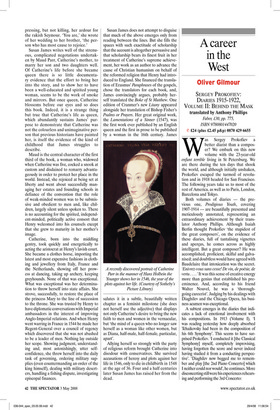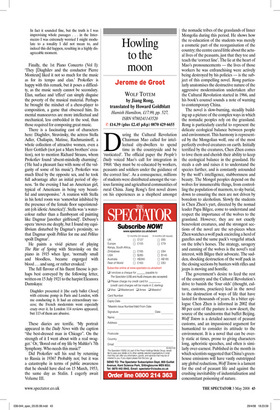A career in the West
Oliver Gilmour
SERGEY PROKOFIEV: DIARIES 1915-1922, VOLUME II: BEHIND THE MASK translated by Anthony Phillips Faber, £30, pp. 775, ISBN 9780801447020 ✆ £24 (plus £2.45 p&p) 0870 429 6655 Was Sergey Prokofiev a better diarist than a composer? We embark on this new volume with the 23-year-old enfant terrible living in St Petersburg. We are there during the ten days that shook the world, and although initially unshaken, Prokofiev escaped the turmoil of revolution and in 1918 headed for San Francisco. The following years take us to most of the rest of America, as well as to Paris, London, Barcelona and Tokyo.
Both volumes of diaries — the previous one, Prodigious Youth, covering 1907-1914 — are beautifully presented and meticulously annotated, representing an extraordinary achievement by their translator Anthony Phillips. Although Isaiah Berlin thought Prokofiev ‘the stupidest of the great composers’, on the evidence of these diaries, full of tantalising vignettes and aperçus, he comes across as highly intelligent. But a great composer? He was accomplished, proficient, skilful and galvanised; and doubtless would have agreed with Baudelaire that intoxication was the secret. ‘Enivrez-vous sans cesse! De vin, de poésie, de vertu . . . .’ It was this sense of creative energy more than genius that established his preeminence. And, according to his friend Walter Nouvel, he was a ‘thoroughgoing careerist’. Judging by his dealings with Diaghilev and the Chicago Opera, his business acumen was exceptional.
A subtext emerges in the diaries that indicates a lack of emotional involvement with his compositions. In 1913 (Volume I), ‘I was reading yesterday how deeply absorbed Tchaikovsky had been in the composition of his 6th Symphony’. This seems to have surprised Prokofiev. ‘I conducted it [the Classical Symphony] myself, completely improvising, having forgotten the score and never indeed having studied it from a conducting perspective’. ‘Diaghilev now begged me to remember and play [the 2nd Piano Concerto] which I neither could nor would’, he continues. More disconcerting still were his experiences rehearsing and performing the 3rd Concerto:
In fact it sounded fine, but the truth is I was improvising whole passages . . . in the Intermezzo I was extremely worried I might modulate to a tonality I did not mean to, and indeed this did happen, resulting in a highly disagreeable moment.
Finally, the 1st Piano Concerto (Vol I): ‘They [Diaghilev and the conductor Pierre Monteux] liked it not so much for the music as for its tempo and elan.’ Prokofiev is happy with this remark, but it poses a difficulty, as the music surely cannot be secondary. Elan, surface and ‘effect’ can simply disguise the poverty of the musical material. Perhaps he brought the mindset of a chess-player to composition, a game that obsessed him. Its mental manoeuvres are more intellectual and mechanical, less embedded in the soul, than those required for composing great music.
There is a fascinating cast of characters here: Diaghilev, Stravinsky, the actress Stella Adler, Chaliapin, Matisse, Rachmaninoff, a whole collection of attractive women, even a Herr Gottlieb (not just a Marx brothers’ creation), not to mention Richard Strauss, whom Prokofiev found ‘absent-mindedly charming’. (‘He had a pleasant face with none of the vulgarity of some of his music’). Prokofiev was much fêted by the opposite sex, and he took full advantage after an initial period of shyness. ‘In the evening I had an American girl, typical of Americans in being very beautiful and unresponsive.’ A reunion with Stella in his hotel room was ‘somewhat inhibited by the presence of the female floor superintendant (oh idiotic America!)’. Stella was ‘a watercolour rather than a flamboyant oil painting like Dagmar [another girlfriend]’. Debussy’s opera ‘moves me deeply, but I found my equilibrium disturbed by Dagmar’s proximity, so that Dagmar spoilt Pelléas for me and Pelléas spoilt Dagmar’.
He paints a vivid picture of playing The Rite of Spring with Stravinsky on the piano in 1915 when Igor, ‘normally small and bloodless, became engorged with blood . . . and sang, or rather croaked.’ The full flavour of his fluent finesse is perhaps best conveyed by the following letter, written on 15 July 1921 to the harpist Eleanora Damskaya: Diaghilev presented it [the early ballet Chout] with extreme pomp in Paris and London, with me conducting it. It had an extraordinary success; the French modernists went especially crazy over it. In London 114 reviews appeared, but 113 of them are abusive.
These diaries are terrific. ‘My portrait appeared in the Daily News with the caption “the best-dressed man in Chicago”. On the strength of it I went about with a real swagger.’ Or, ‘Bored out of my life by Mahler’s 7th Symphony. Who needs this music?’ Did Prokofiev sell his soul by returning to Russia in 1936? Probably not; but it was a catastrophe in terms of public awareness that he should have died on 15 March, 1953, the same day as Stalin. I eagerly await Volume III.



















































































 Previous page
Previous page